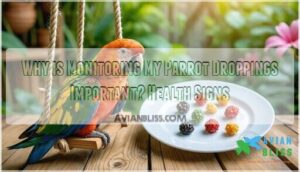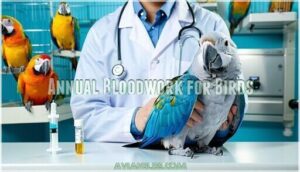This site is supported by our readers. We may earn a commission, at no cost to you, if you purchase through links.

You’ll catch early warning signs of illness before your bird shows obvious symptoms, since birds naturally hide sickness to avoid appearing vulnerable to predators.
Changes in color, consistency, frequency, or volume can signal digestive issues, infections, liver problems, or dietary concerns that need immediate attention.
Think of it as your bird’s daily health report card—normal droppings mean you’re doing something right, while unusual ones wave a red flag.
Understanding what’s normal versus concerning can literally save your feathered friend’s life, and there’s more to this detective work than meets the eye, involving careful observation of your parrot’s daily health report and recognizing early warning signs.
Table Of Contents
- Key Takeaways
- Why is Monitoring My Parrot Droppings Important?
- Importance of Monitoring Parrot Droppings
- Signs Your Bird is Healthy
- Subtle Signs of a Sick Bird
- More Serious Signs Your Bird May Be Sick
- Causes of Changes in Your Bird’s Droppings
- The Benefit of Weekly Weight Checks for Your Bird
- The Importance of Annual Veterinary Examinations for Birds
- Annual Bloodwork for Birds
- Role of Nutrition in Bird Health
- Frequently Asked Questions (FAQs)
- Why should you monitor your bird’s droppings?
- What happens if a parrot poop changes?
- How often should you monitor parrot droppings?
- How to keep a parrot healthy?
- How often do parrots poop?
- How do you know if a parrot is healthy?
- Is parrot poop a health hazard?
- What does unhealthy parrot poop look like?
- Why is bird poop important?
- Are bird droppings a health hazard?
- Conclusion
Key Takeaways
- You’ll catch serious health problems early before your parrot shows obvious symptoms, since birds naturally hide illness to avoid appearing vulnerable to predators.
- Daily dropping analysis reveals infections, liver disease, digestive issues, and dietary problems through changes in color, consistency, frequency, or volume that need immediate attention.
- Normal droppings every 20-30 minutes with firm texture, green/brown feces, clear urine, and white urates indicate you’re maintaining proper nutrition and care routines.
- Regular monitoring combined with weekly weight checks and annual vet exams creates a comprehensive health system that can literally save your feathered friend’s life.
Why is Monitoring My Parrot Droppings Important?
Your parrot’s droppings are like a daily health report card. Think of yourself as a detective solving mysteries through parrot health monitoring and bird droppings analysis.
Your feathered friend’s poop tells the whole story – decode it like the bird detective you were meant to be.
Healthy droppings appear firm and well-formed, with green or brown fecal matter, clear urine, and white urates. Your bird should produce these health indicators every 20-30 minutes.
Changes in color, consistency, or frequency signal potential problems requiring attention. Regular droppings analysis helps you spot trouble early.
Watery droppings might indicate infections, while blood requires immediate veterinary care. Dark feces could suggest liver issues, and unusual odors often point to internal problems.
By monitoring parrot droppings daily, you’ll establish a baseline for bird wellness. This fecal examination routine lets you catch illness before it becomes serious.
Place white paper beneath the cage for better visibility – parrot hygiene starts with observation. Remember: your bird can’t tell you when something’s wrong, but their droppings can speak volumes about their health.
Importance of Monitoring Parrot Droppings
Why wouldn’t you keep tabs on your parrot’s droppings? Think of droppings analysis as your bird’s daily health report card.
Parrot droppings reveal essential health indicators through fecal examination and urine testing. Bird droppings analysis helps you spot problems before they escalate into serious issues.
Droppings color meaning changes signal everything from dietary shifts to infections. Daily bird health monitoring through parrot hygiene practices gives you early warning signs.
Regular parrot health monitoring combined with clean cage papers makes abnormalities pop right out, keeping your feathered friend healthy and happy.
By recognizing abnormal droppings signs, you can take prompt action to address potential health issues in your parrot.
Signs Your Bird is Healthy
Healthy birds produce telltale signs through their droppings that’ll put your mind at ease.
You’ll notice firm, well-formed coils with green or brown fecal portions depending on diet, plus clear liquid urine and creamy-white urates.
These droppings appear every 20-30 minutes like clockwork, showing your bird’s digestive system runs smoothly.
Key healthy indicators include:
- Droppings consistency: Firm texture without mushiness or excessive dryness
- Behavior patterns: Active eating, drinking, and alert responses throughout the day
When monitoring droppings color and frequency, you’re basically reading your bird’s health report.
Normal droppings analysis reveals balanced components that reflect proper nutrition and organ function.
Eye clarity, feather condition, and beak health complement these dropping observations for complete health assessment.
Subtle Signs of a Sick Bird
Early detection through droppings analysis can save your feathered friend’s life.
Subtle variations in droppings color, texture, or frequency often signal illness before obvious symptoms appear.
Watch for feather condition changes like dullness or plucking, beak shape abnormalities, eye discharge, or altered respiratory rate.
Regular monitoring of your bird’s health through bird poop monitoring is essential for identifying potential issues early on.
| Early Warning Sign | What to Watch For |
|---|---|
| Droppings Color | Yellow, green, or red tints |
| Feather Condition | Fluffed, dull, or excessive preening |
| Beak Shape | Overgrowth or color changes |
Bird poop analysis combined with behavioral monitoring helps identify problems early.
Bird health depends on catching these whisper-quiet warning signs.
More Serious Signs Your Bird May Be Sick
While subtle symptoms matter, some warning signs demand immediate action.
When serious symptoms surface, your bird needs immediate veterinary attention—no waiting, no second-guessing.
Watch for these serious red flags that signal urgent parrot health issues:
Respiratory Issues: Open-mouth breathing, wheezing, or rattling sounds indicate breathing distress. Unlike humans who breathe through their mouths when congested, birds should always breathe through their nostrils.
Neurological Signs: Head tilting, seizures, or loss of coordination suggest brain or nervous system problems requiring emergency care.
Fecal Abnormalities with Blood Presence: Red or black droppings indicate internal bleeding, while mucus suggests intestinal disease. These changes in droppings color and droppings consistency often signal organ dysfunction.
These symptoms don’t wait for convenient veterinary hours – they demand immediate professional attention for proper bird illness detection.
Causes of Changes in Your Bird’s Droppings
Understanding why your bird’s droppings change helps you catch health problems early.
Several factors can alter what you see in that cage paper, from simple diet shifts to serious infections that need immediate attention, which can be a key indicator to catch health problems early.
Diet
Your parrot’s diet directly influences dropping appearance. Seed Types produce brown or dark green feces, while Pellet Nutrition creates lighter, bulkier stools. Fresh Fruits like berries temporarily tint droppings red or purple. Vegetable Intake increases green coloration. Water Quality affects urine volume, making droppings appear wetter.
| Food Type | Dropping Color | Consistency Effect |
|---|---|---|
| Seeds | Brown/Dark Green | Firm, compact |
| Pellets | Light Brown/Green | Bulky, well-formed |
| Fruits/Vegetables | Variable colors | Watery, loose |
| High-protein foods | Normal color | More white urates |
Parrot diet quality matters—poor nutrition creates abnormal bird droppings color and texture. Monitor these changes as diet and nutrition directly impact parrot droppings appearance, helping you distinguish normal dietary effects from illness.
Providing a balanced parrot food supply is essential for maintaining healthy droppings and overall bird health.
Intestinal Diseases
Beyond diet-related changes, intestinal diseases pose serious threats to your parrot’s gut health.
Parasite infections like Giardia cause watery droppings and malnutrition. Bacterial infections create bloody stools, while intestinal blockage stops normal elimination entirely.
Digestive issues from tumors produce undigested food particles. Watch for intestinal inflammation signs: mucus, frequency changes, or unusual odors.
Fecal analysis helps identify specific pathogens requiring targeted treatment. Maintaining ideal parrot health requires understanding of parrot health supplements.
Liver Diseases
Liver diseases create dramatic changes in your bird’s droppings that you can’t ignore.
When liver function deteriorates, expect bright yellow or pea-green feces as liver dysfunction affects bile production.
Urine color may shift dramatically, while foul odors signal liver damage. Avian hepatitis and toxic exposure compound these problems.
Regular fecal analysis helps catch liver diseases early, before your feathered friend faces serious complications.
For further accuracy, consider the benefits of a comprehensive Liver Disease Test for birds.
Infections
Infections wreak havoc on your parrot’s digestive system.
Bacterial infections, viral outbreaks, and parasite control issues often cause watery droppings, blood, or undigested food particles.
Fungal diseases can create unusual colors or textures.
When respiratory issues accompany abnormal parrot droppings, infections are likely culprits requiring immediate veterinary attention for proper diagnosis and treatment.
The Benefit of Weekly Weight Checks for Your Bird
While understanding changes in your bird’s droppings provides valuable health insights, weekly weight checks offer another powerful monitoring tool.
Weight fluctuations often signal health issues before other symptoms appear, making this practice invaluable for preventive health measures.
Regular bird droppings monitoring combined with weight management creates a thorough health picture.
You’ll catch problems early when your feathered friend’s weight shifts unexpectedly.
Think of it as your bird’s report card – consistent weight means you’re doing things right.
- Track weekly weights in a simple log to show your vet trends over time
Document sudden changes promptly.
A healthy bird maintains stable weight within a few grams.
Cross-reference poop volume and frequency with weight data for complete assessment.
This dual approach helps distinguish between normal variations and concerning patterns.
Your bird’s Nutrition Balance directly impacts both weight stability and dropping characteristics, while proper Bird Hydration affects both measurements.
Feather Condition and Beak Health often correlate with weight changes, providing additional health indicators for thorough care.
The Importance of Annual Veterinary Examinations for Birds
Think of annual veterinary examinations as your bird’s yearly tune-up – these Bird Health Checks catch problems before they become emergencies.
Your Avian Wellness professional performs thorough physical examinations, evaluates diet and behavior, and may recommend diagnostic tests beyond what you observe at home through bird droppings monitoring.
These Annual Exams establish vital health baselines, making subtle changes easier to spot later.
Your vet’s trained eye can identify parrot health signs that aren’t obvious to even dedicated bird parents.
Preventive health measures during these visits often prevent minor issues from becoming serious complications.
Don’t wait for concerning droppings or behavioral changes – proactive Preventive Measures through regular Veterinary Care keep your feathered companion healthier longer.
Schedule that annual veterinary examinations appointment before problems arise, not after.
Annual Bloodwork for Birds
Most bird owners think annual checkups are enough, but annual bloodwork acts like a crystal ball for your feathered friend’s health.
This blood test reveals hidden problems before symptoms appear, establishing vital baseline values for future comparisons.
Annual bloodwork provides three key benefits:
- Early detection of organ dysfunction, infections, or heavy metal poisoning
- Baseline tracking that helps avian veterinarians spot subtle health changes over time
- Preventive health monitoring that improves prognosis when problems do arise.
The procedure is minimally invasive, requiring only small blood samples for thorough diagnostic tools that keep your bird healthier longer.
Regular health checks, including a vet visit checklist, are essential for maintaining your bird’s overall well-being.
Role of Nutrition in Bird Health
Your parrot’s balanced diet directly impacts their droppings and overall health.
Proper nutrient intake and food quality support ideal digestive health while meeting your bird’s specific dietary needs.
An avian veterinarian can provide personalized bird nutrition advice based on your parrot’s species and age.
Quality nutrition helps maintain consistent bird droppings consistency, making parrot behavior observation more reliable for health monitoring.
When you provide fortified diets with essential nutrients, you’ll notice improvements in energy levels and waste patterns during your routine avian health checks.
Even minor dropping changes may indicate nutritional disorders requiring complete blood work evaluation.
Frequently Asked Questions (FAQs)
Why should you monitor your bird’s droppings?
Regular monitoring helps you catch health problems early—changes in color, consistency, or frequency often signal illness before other symptoms appear, potentially saving your bird’s life.
What happens if a parrot poop changes?
Changes in your parrot’s poop can signal serious health problems like infections, liver disease, or internal bleeding.
You’ll need immediate veterinary attention if you spot blood, unusual colors, or persistent changes lasting over 24 hours, which can indicate severe issues like internal bleeding.
How often should you monitor parrot droppings?
Daily dropping checks deliver decisive health data you’ll desperately need.
Monitor every 20-30 minutes when they’re produced, but focus on establishing your baseline through consistent daily observations for early problem detection.
How to keep a parrot healthy?
Maintain ideal health by providing balanced nutrition, scheduling annual vet exams, monitoring droppings daily, ensuring proper hygiene, and watching for behavioral changes that signal illness early.
How often do parrots poop?
Healthy parrots defecate every 20-30 minutes throughout the day.
You’ll notice this frequent schedule reflects their fast metabolism and efficient digestion.
This timing helps you establish baselines for monitoring their health effectively.
How do you know if a parrot is healthy?
You’ll spot a healthy parrot through bright eyes, smooth feathers, active behavior, regular eating, and normal droppings. Watch for consistent energy levels, clear breathing, and proper weight maintenance daily.
Is parrot poop a health hazard?
While you might think bird droppings aren’t risky, parrot poop can carry dangerous bacteria like salmonella and chlamydia that cause serious respiratory infections in humans, especially kids and immunocompromised individuals.
What does unhealthy parrot poop look like?
Unhealthy parrot droppings show blood, mucus, watery consistency, unusual colors like yellow/green urates, black/tar-like feces, or foul odors requiring immediate veterinary attention.
Why is bird poop important?
You’re holding a crystal ball for your bird’s health when you monitor their droppings.
These waste products reveal digestive function, organ health, infections, and dietary issues before visible symptoms appear, enabling early intervention, which is a key factor for your bird’s overall well-being, particularly in terms of digestive function.
Are bird droppings a health hazard?
Bird droppings can pose health risks through bacteria, fungi, and parasites that cause respiratory infections, histoplasmosis, and salmonella.
You’re most vulnerable when cleaning dried droppings without protection, so always wear gloves and masks.
Conclusion
Like a lighthouse keeper scanning the horizon for storms, you’ve learned why monitoring your parrot’s droppings is essential for detecting health issues before they become life-threatening emergencies.
Changes in color, consistency, or frequency serve as early warning signals that help you catch infections, liver problems, or digestive disorders when treatment is most effective.
Regular observation, combined with weekly weigh-ins and annual vet checkups, creates a thorough health monitoring system that keeps your feathered companion thriving for years, using weekly weigh-ins and annual vet checkups.
- https://nilesanimalhospital.com/files/2012/05/The-Dropping-_-An-Indicator-of-Health.pdf
- https://www.wrennz.org.nz/post/avian-poopology-101
- https://www.avianwelfare.org/shelters/pdf/NBD_shelters_symptoms_of_illness.pdf
- https://www.bulbapp.com/u/bird-poop-identification-chart-monitoring-your-bird%E2%80%99s-droppings
- https://www.veterinary-practice.com/article/diarrhoea-in-pet-parrots










